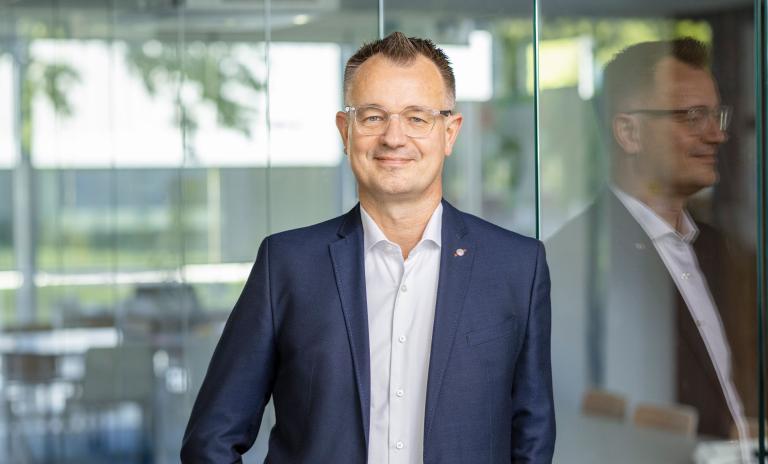Robust Organizations
Roland Berger regularly publishes studies on the topic of robust organizations, discussing how corporations revolve stronger from change, disruption and crises.


By Fabian Huhle and Beate Rosenthal
Nestlé Deutschland AG has been strategically transforming their entire organization for years. Moving to the brand-new head office building in downtown Frankfurt is intended to symbolize the company's transformation: more innovative, more sustainable, more transparent. Human Resources Director Ralf Hengels has been steering the company's cultural change since the process began in 2019. We spoke with him about promising transformation approaches, the tailwind provided by coached executives, and embedding a new corporate language.

Ralf Hengels is HR and Labor Relations Director of Nestlé Deutschland AG. With a degree in business administration, Hengels has held various roles in Human Resources for the food and beverages company since 2008. He was appointed to the Management Board of Nestlé Deutschland AG in October 2016.
Nestlé Deutschland AG, based in Frankfurt and employing around 7,000 people, is part of the global Nestlé SE organization based in Vevey, Switzerland. Nestlé was founded more than 150 years ago in Switzerland by Heinrich Nestlé from Frankfurt and is now the world's largest food company, selling over 2,000 brands – from baby food to beverages, coffee and confectionery to pet food – in 188 countries worldwide.
Beate Rosenthal: The relocation of Nestlé Germany from the south side of Frankfurt to the city center marks the start of a new phase for the company. Back in the company founder's birthplace, the move is meant as a signal for transformation and dialogue, and ultimately for the cultural change taking place at Nestlé. What was it that motivated and triggered this cultural change?
Ralf Hengels: We launched our cultural program back in 2019. The aim was to strategically reposition the company as a whole in order to better meet the complex challenges of our time and our industry. Our focus at the time was on sustainability and designing healthier products, along with the issue of innovating in a demanding competitive environment. Yet we also knew that our corporate culture needed to evolve in order for us to mobilize all forces within the company towards our ambitious business objectives. When you set yourself big goals, you need all the energy and commitment of the organization to step up to the challenges ahead of you.
Fabian Huhle: How did you approach cultural change as a topic and what exactly did you do?
Ralf Hengels: We started with a kind of preliminary phase with the management team where we first identified the most important areas we wanted to work on. Our aim was to then define specific measures within those areas and to set up the projects necessary to deliver them. From that point onwards, we got experts, managers and employees throughout the company intensively involved. We approached people directly and invited them to participate. But people also came to us themselves and expressed their interest in working with us. This gave us a good cross-section of the workforce in terms of age, tenure and expertise. For each of the five defined topics, we had a project team of 20 to 25 colleagues.
Fabian Huhle: Can you tell us what the topics were?
Ralf Hengels: One topic was communication. We realized that we often communicate with each other or externally in a very scientific and unemotional way. Our goal was to establish a new corporate language, one that's characterized by appreciation and empathy but is also bold, respectful and inspiring. We call this new language concept "HENRI" - Heartfelt, Encouraging, Natural, Respectful, Inspiring. I believe that we have embedded it in the organization well and quickly. Now, when people submit a draft text, they are often told to be a little more "HENRI" in their wording.
Fabian Huhle: The COVID pandemic slowed down some of your project work on cultural change. So you launched an online coaching program in response.
Ralf Hengels: The pandemic did indeed disrupt our schedule. Instead of the planned face-to-face workshops, we had to think about virtual formats. It was well to roll out an individual online coaching program based on TheNextWe app during this difficult time. Our goal in doing so was threefold: we wanted a new management culture, more innovation and better collaboration. We've made great progress. Five hundred managers have completed the online coaching program. Additionally, we have developed workshop formats for the teams focused on self-reflection and improving collaboration. For this, we now use our own coaches and moderators and are no longer reliant on external support. We have professionals from within our own ranks now, who can conduct significantly more workshops than were possible two years ago.
Beate Rosenthal: How did you ultimately manage to combine the individual topics into an overall program of cultural change?
Ralf Hengels: The program elements were well aligned from the outset. Of course, we were still doing continuous monitoring, gathering feedback and making adjustments where necessary. One thing quickly became clear: we needed to give the teams more time to interact with each other and develop good collaboration. That's why we used the Insights Discovery model to help the teams understand and get to know each other better individually and as a group.
Fabian Huhle: Which topic would you say has gained importance in the process?
Ralf Hengels: Definitely the topics of sustainability and innovation. It emerged as a key objective in the discussion about innovation processes and has had a major influence on our culture. For example, as a company we want to be bolder in trying out forward-looking things and maybe even developing a new product in collaboration with retailers.
Beate Rosenthal: How are you monitoring the status of the cultural change?
Ralf Hengels: By listening to the company and the teams: evaluating the results of surveys very carefully, reflecting on town hall meetings. Two things we've noticed are 1) that people are increasingly being bold enough to initiate projects together. And 2) they are clearly letting us know what we should be focusing on even more strongly going forward, and usually they even make their own suggestions. Our feedback culture is now very strong. Specifically, this means that managers also get to hear critical comments that they weren't used to hearing before. They're having to learn how to deal with that and find solutions.
Fabian Huhle: You're also planning a major international employee survey for 2024. Will cultural change be a topic in that?
Ralf Hengels: Yes, it's a great opportunity to gain new insights and explore options. The challenge is certainly to separate cultural change from other current issues. Otherwise, we run the risk of the general economic situation and geopolitical crises overshadowing everything and negatively influencing it.
Beate Rosenthal: Since 2023, there have been several changes at Nestlé Germany at the board and management level. How have you dealt with this?
Ralf Hengels: That was certainly one of the challenges that comes when you embark on a journey of cultural change together as a team and then some of the people involved change. In a situation like that, it's important that the things that have been agreed don't suddenly disappear when the personnel changes. One of my tasks is to ensure this continuity.
Fabian Huhle: You're talking about leadership now. How have you addressed leadership and the role of managers within the cultural change?
Ralf Hengels: We have already turned 500 managers into real ambassadors of change through the coaching and various workshop formats I mentioned. The initial fear that people might perceive participation as an obligation rather than an opportunity did not turn out to be true. Quite the opposite: we had a lot of demand from managers who wanted to take their own initiatives in their areas of responsibility. So, we didn't need to create a "burning platform" to get the change started. Our managers acted out of self-motivation and drove the process forward themselves. Reducing the gulf between the hierarchies was certainly a success factor – there's no more "us and them". The managers' video self-presentations and an approachable interaction with one another certainly helped there.
Fabian Huhle: What role did the HR function play in this process of change and how was HR able to influence things effectively?
Ralf Hengels: We were able to show what we can do. Many members of the management team became aware that we have HR resources across the organization who are making a valuable contribution to the transformation. We offered practical proof, so to speak, because after all, we have been talking for years about HR having a voice at the management table and wanting to be heard. The prerequisite for achieving that is to act like a true business partner and make a real contribution as a supporter and advisor with a deep understanding of the business and the way it is performing. We're benefiting from the fact that the company's management is increasingly recognizing that business success depends on good interpersonal cooperation and teamwork.
Fabian Huhle: Could your managers have pulled off the cultural change on their own?
Ralf Hengels: That is hard to assess. In the end, every result is a team effort, and I am proud that the HR team was so actively involved here. We've had some very good feedback from top management, employees and the works councils about us taking the lead and how we managed the process. At the same time, we've also begun to challenge ourselves: From the way we communicate to the overall employee experience, we're asking ourselves how we can simplify our processes even further and consider things more from the employee's perspective. But we are also concerned with questions about greater sustainability and the potential applications of increased digitalization, including artificial intelligence.
Beate Rosenthal: Speaking of artificial intelligence (AI): What experience have you already gained with AI solutions for taking your HR work to the next level?
Ralf Hengels: AI solutions are already being used in numerous areas of the company. We're currently in the process of stepping this up for the HR function. Right now, we have a chatbot that can answer simple, standardized questions from employees. To be honest, we're not satisfied with the results yet and we are still far from a true AI solution. Ultimately, it comes down to providing the right kind of data that the tool can then use to have real dialogues with people. We hope this will enable us to reach the decentralized units even better to help them with HR issues and simple tasks like document management.
Beate Rosenthal: Where do you see the trend heading?
Ralf Hengels: I personally see a lot of value in 360-degree feedback within performance management. Where you used to have to painstakingly work through pages and pages of comments, you can now use the company's internal “NesGPT” solution to obtain a clear summary with just a few clicks that you can share with the employees, which makes it much easier to engage in a dialogue. We're currently running a series of hackathons around the world to identify these and other solutions that we can use. Based on jointly identified problem statements for HR processes, we outline what a solution could look like and whether there are already any existing tools for that. Our global experts then follow up on the top solutions and put resources into them. I am firmly convinced that AI programs hold great potential for us and will make our lives an work noticeably easier in many areas in the future.
Beate Rosenthal and Fabian Huhle: Ralf Hengels, thank you for talking to us.